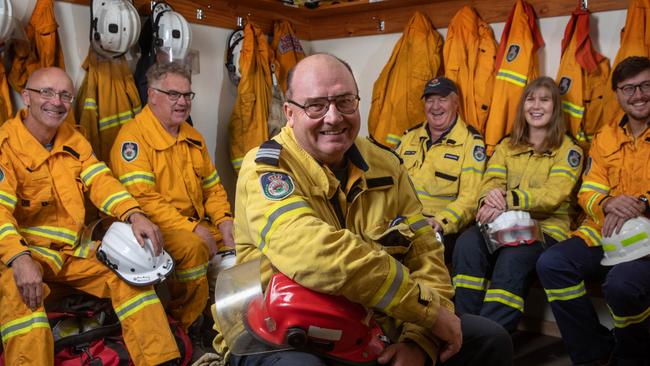Local hero led the firefight far and wide
BCA’s Biggies Awards finalist: Scott Hart of Braidwood Community Bank wants is to do right by his community, and he spent months battling the fires in NSW.

The Business Council of Australia’s Biggies Awards finalist: Scott Hart of Braidwood Community Bank wants is to do right by his community, and he spent months battling the fires in NSW.
-
Scott Hart says that at the end of the day all he wants is to do right by his community, whether that’s fighting at the fire front, running the show at the local bank, or cutting the grass for those who can’t do it themselves.
The generous hearted Braidwood man has a high-powered job in the local bank in his southern town. His work can be stressful but in the 2019-2020 summer, a day in the office offered some down time for Hart, a volunteer firefighter who spent months battling the fires in NSW.
Hart, a customer relationship manager at the Braidwood Community Bank, part of the Bendigo and Adelaide Bank, spent all but 16 days on the firefronts between November 2019 and February 2020 keeping walls of flame at bay.
Braidwood is 90km from Canberra in the Southern Tablelands as they slice off the Budawang Range. Its location meant it was in a tight spot as fires from the Black Summer roared down towards the Victorian border.
As commander of the local volunteer fire brigade, Hart’s job was to keep the town and its people safe in the face of a firefront not seen for a lifetime. For months he slogged it out — backburning, cutting back, and fighting spotfires.
For weeks at a time Hart was away from home, fighting fires in Grafton and Lake Macquarie before turning back to Braidwood when the fires came for the south coast.
“The smoke was a constant thing, and to get into my little office at work, where you can’t see outside, was a bonus,” he says.
“The phone would still ring but because I wasn’t currently sitting in the thick of things it’d be a quick phone call and no expectations from me while I was having a day away from it.” A day in the office was the only respite from days in the field, something only made possible thanks to the unlimited leave policy from Bendigo and Adelaide Bank.
“When the fires got going down here, my boss Craig said, ‘Don’t come back to work until this is dealt with’,” Hart says. “Pretty sure he didn’t think it would take so long.”
The bank gives paid leave to staff who volunteer to respond to emergencies. Since April 2019, the bank has processed 22 leave requests for Emergency Services Leave, paying out more than $19,000 to cover the cost. Almost 17 of those requests were between December 2019 and May 2020, as employees went off to fight the fires and respond to the floods that followed.
Thanks to Bendigo and Adelaide Bank’s leave policy, Hart was able to devote himself to the fight.
“Braidwood and all of these places are still on the map,” he says. “If we hadn’t gone there they wouldn’t be.”
Hart’s colleague and fellow RFS volunteer Simon Disney praised his dedication. “Few firefighters worked as hard through summer as Captain Scott Hart and his crew to earn the NSW Premier’s Bushfire Emergency Citation,” he says.
Since April, Bendigo and Adelaide Bank has processed another 56 requests for Natural Disaster Leave for employees who need to evacuate or respond if their property is under threat. The response has cost the bank a further $23,000.
“On the community and social responsibility side the bank is leading the way,” Hart says. “Looking after the community at whatever scale that is, from the smallest village up to the planet.”
But Bendigo and Adelaide corporate affairs executive Alexandra Gartmann says the real extent of volunteering among the bank’s workforce was far greater than the figures captured by the bank.
“We’ve got 1900 community bank directors plus staff who volunteered across fire, ambulance, the SES,” she says.
Gartmann says the experience of the Black Summer bushfires had been an eye-opener for the corporate sector about how it could play a constructive role in response to a crisis.
“COVID was a trigger more broadly to talk about some of our people policies and how we are supporting people,” she says.
Months on from the fires, Hart still keeps an eye on the long grass and overgrown paddocks around the town.
He speaks to The Deal on one of his now rare days out of the office, a day he is using to cut the grass for those who can’t.
“One of those things that came out after the fires is that I realised there were a lot of people who needed a lot of help in a lot of different ways,” he says.
But the work is never done, whether it’s car crashes or COVID-19: “It’s never quiet, the fires stopped but then there’s the car accidents and everything else we attend to.”
Hart has given almost 38 years to the fire service but intends to hang in at the bank and the brigade “while heaven and health hang in there”.
“My word, it’s a way of life,” he says.
“I’ll continue to do it and when health gives out I’ll sit around and tell war stories.”
-
Q&A
Scott, what was the biggest challenge you faced in your community work last year?
The issues we’ve had have been the fears of COVID. It has been a big thing in a small community. Trying to sort the wheat from the chaff, trying to do the right things and not do silly things. It’s never quiet. Yes, the fires stopped but then there’s the car accidents and everything else we attend to.
What should government do to help overcome some of the problems you became aware of last year?
The council could do more along the roadsides. When push comes to shove that’s where most fires are going to come from, whether that’s someone throwing a cigarette, or a trailer with hot wheel bearings pulling up in the grass.
Should business do more and, if so, what should they do?
It’d be great if businesses were able to get engaged and advertise the idea that this is the time to do it. To get backup the way the staff were released to fight the fires. How about we donate a small percentage of time just to run a blade over the grass now and again. Most of your grass fires are going to start on the road. It’d be great if the hazards were minimised. Council and business can adopt a stretch of road. We already do it with Clean Up Australia Day.







